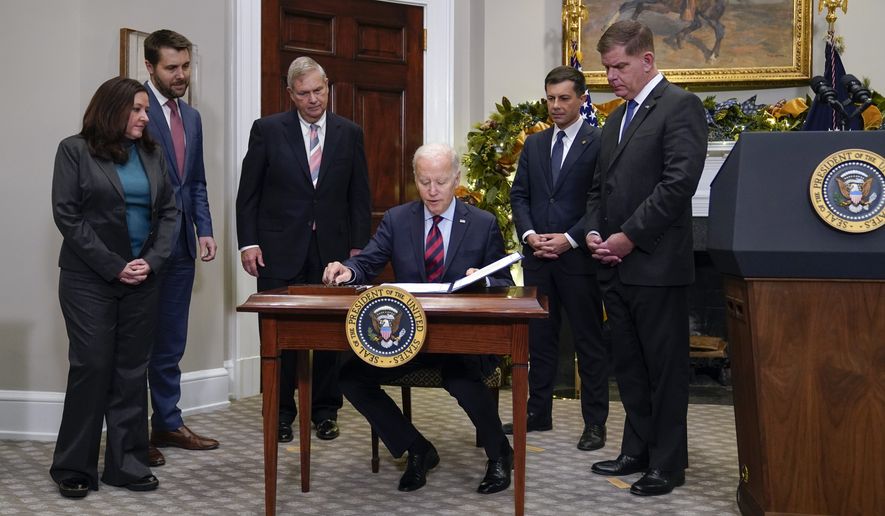President Biden signed into law legislation that will block a rail strike amid the holiday season.
Ahead of signing the bill Friday, Mr. Biden said the measure will avoid an “economic catastrophe.”
“Our nation’s rail system is literally the backbone of our supply chain, as you all well know,” Mr. Biden said. “So much of what we rely on is delivered on our rail from clean water to food and gas and every other good. A rail shutdown would have devastated our economy.”
A strike could devastate the U.S. economy by disrupting the supply chain, halting passenger travel and delaying critical materials from reaching water treatment plants during the height of the holiday season. Freight rail companies said a strike would cost the U.S. economy roughly $2 billion per day.
Mr. Biden said 765,000 Americans would have been put out of work had there been a rail strike.
Despite his history as a pro-union president, Mr. Biden ultimately called on Congress to intervene when talks between union workers and rail companies stalled.
Mr. Biden said he still supports unions, but it was necessary to protect the U.S. economy.
“It was tough for me, but it was the right thing to do at the moment to save jobs and protect millions of working families from harm and disruption and keep the supply chain stable around the holidays,” he said.
Mr. Biden’s remarks come one day after the Senate voted to bind rail companies and worker unions to a proposed settlement negotiated by the Biden administration in September. That settlement had been rejected by four of the 12 unions involved, triggering fears of a rail strike on Dec. 9 that threatened to cripple a fragile U.S. economy.
The Senate approved the measure in an overwhelmingly bipartisan 80-15 vote. It was backed by the House on Wednesday, sending it to Mr. Biden’s desk for his signature.
Under the agreement, rail workers will receive a 24% salary increase by 2024 and gain more flexibility to take time off for doctor’s appointments. It also grants them one paid personal day but does not include any paid time off for sickness.
Paid sick leave benefits were a sticking point in the negotiations. Critics of the deal say it didn’t offer the paid sick leave that union leaders had fought to include.
Democrats in the House and Senate mounted last-ditch efforts to add additional paid leave days to the deal, while Republicans sought a deal that would have pushed negotiations into next year. Neither side’s attempts to change the Biden-backed deal’s terms were successful.
The Senate took a second vote to add seven days of paid sick leave to the initial agreement, but that measure fell well short of the 60-vote threshold.
Mr. Biden pledged that he would continue to fight for sick leave but touted the contract as a good deal. He also said he will fight for paid sick leave for all Americans, not just rail workers.
“These rail workers and, frankly, every worker in America deserves [paid sick leave],” Mr. Biden said. “That fight isn’t over. I didn’t commit that we’re going to stop just because we couldn’t get it into this bill.”
The vote Thursday was the first time Congress had intervened in a rail strike since 1992, invoking a century-old law that gives it the power to avert shutdowns.
• Jeff Mordock can be reached at jmordock@washingtontimes.com.




Please read our comment policy before commenting.